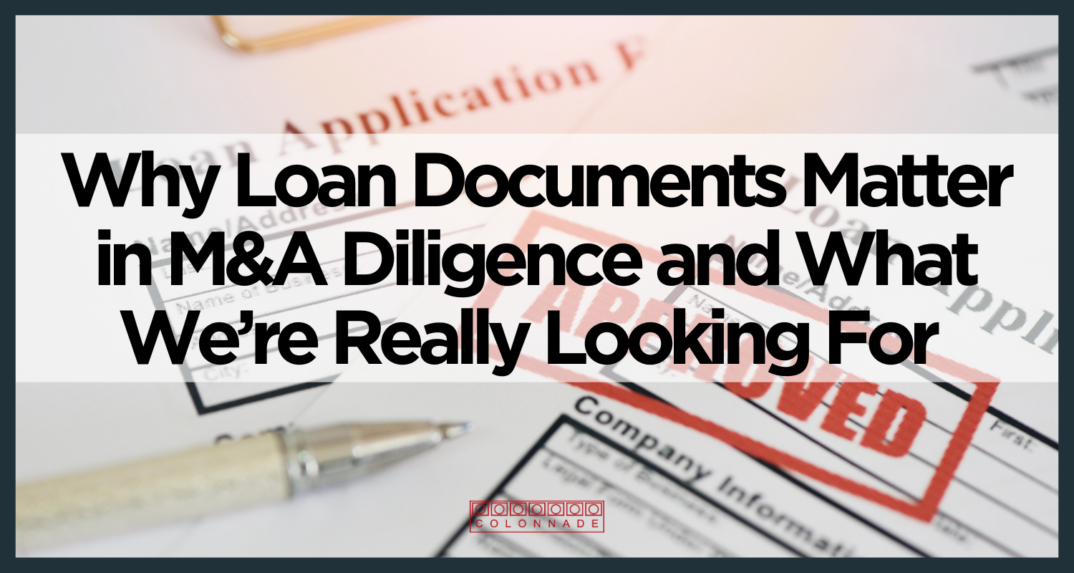Why Loan Documents Matter in M&A Diligence—And What We’re Really Looking For

In the world of M&A, one of the most critical areas of financial due diligence is a target company’s debt and loan structure. For acquirers and investors, debt is not just a line on the balance sheet—it carries implications for risk, cash flow, and deal structure. That’s why, at Colonnade Advisors, we always request a full set of loan documents as part of our diligence process.
These documents don’t just explain the obligations of the business—they tell a deeper story about how a company is financed, how tightly it operates, and where future risks may lie.
The Full Set: Loan Documents We Always Request
For each loan, we ask for a complete package of documentation. Here’s what we request—and why it matters:
1. Loan Agreement
This governs the terms and conditions of the loan, including the principal amount, interest rate, maturity date, repayment terms, and covenants.
🔎 Why it matters: It tells us how restrictive the debt is, how much flexibility the company has, and whether the terms are market-based or overly burdensome.
2. Security Agreement
This document grants the lender a security interest in the company’s collateral, such as equipment, inventory, or accounts receivable.
🔎 Why it matters: It reveals what assets are encumbered and whether the lender has claim over mission-critical parts of the business.
3. Guaranty Agreement
If individuals or affiliated entities are guaranteeing the loan, this document spells out those repayment obligations.
🔎 Why it matters: Personal or cross-entity guarantees can have implications for post-close liability, and may require restructuring in a sale.
4. Intercreditor Agreement
This defines the rights and priorities of multiple lenders—typically between senior and subordinate lenders.
🔎 Why it matters: It helps us understand the pecking order of creditors in a default or liquidation scenario.
5. Subordination Agreement
Similar to the above, this establishes the priority of senior debt over other obligations, including shareholder loans or mezzanine financing.
🔎 Why it matters: Subordinated debt may be “hidden” behind the senior facility, and this agreement confirms how it’s treated.
6. Collateral Assignment
This document assigns specific rights to collateral, such as a contract or an account receivable.
🔎 Why it matters: These can indicate whether high-value revenue streams or key customer relationships are pledged to the lenders
7. UCC-1 Financing Statement
A public filing used to perfect a lender’s security interest in specific collateral under the Uniform Commercial Code.
🔎 Why it matters: It confirms the legal enforceability of the lender’s claims and identifies other claims against the same assets.
8. Mortgage or Deed of Trust
If real estate is involved, this document secures the loan with the property.
🔎 Why it matters: It flags potential real estate encumbrances that might complicate a transaction or trigger change-of-control clauses.
9. Borrowing Base Certificate (BBC): A Window Into
Operational Discipline
Of all the documents we request, Borrowing Base Certificates are among the most revealing—and yet, they are often overlooked by sellers.
What is a Borrowing Base Certificate?
A Borrowing Base Certificate is a recurring report provided to the lender—often monthly or quarterly—under an asset-based loan (ABL) facility. It calculates the amount the company is eligible to borrow based on a percentage of its eligible assets, typically:
- Accounts Receivable (e.g., 85% of A/R under 90 days)
- Inventory (e.g., 50% of finished goods)
- Sometimes, other short-term assets
The borrowing base determines the maximum revolving credit availability, and must be supported by detailed schedules showing the underlying assets.
Why We Request Every BBC Since Loan Inception
📌 They show actual performance vs. reported numbers.
The BBC tracks operational assets in detail over time, which allows us to compare revenue, receivables, and inventory trends with the financial statements.
📌 They reveal liquidity management.
How much has the company drawn on its line? Are they constantly maxed out? Have they ever tripped covenants? This speaks volumes about how tight cash flow management really is.
📌 They expose working capital quality.
Not all A/R is created equal. The BBC identifies which receivables are current and which are aged out or excluded, providing insight into credit policies and customer quality.
📌 They highlight seasonality and volatility.
Patterns in borrowing usage over time can identify cyclical risks, cash flow shortfalls, or upcoming capital needs.
📌 They uncover operational discipline.
Preparing BBCs requires internal controls, schedule integrity, and financial rigor. Sloppy or missing BBCs are a red flag for acquirers.
Final Thoughts: Don’t Let Debt Be a Surprise
Loan documents are not just about legal obligations—they are a blueprint of how the company is financed and how it operates. They directly influence how a deal is priced, structured, and negotiated.
By compiling a full set of loan documents—including every Borrowing Base Certificate since inception—sellers demonstrate transparency, operational maturity, and financial control. In turn, buyers gain confidence, which leads to smoother diligence and better outcomes.
Thinking about a sale or recapitalization in the next 12–24 months? Now is the time to organize your loan documents. If you need help preparing for diligence, the Colonnade team is ready to assist.
📩 Contact us at www.coladv.com to start the conversation.


